英语bk4u2Active2
Kid27s Box Book 4 Unit 2 Book 4 剑桥少儿英语第四册 2单元教案
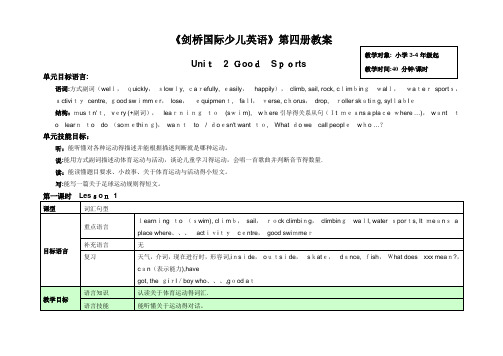
◆讨论每幅图片。(组成搭档将图片与第一部分里出现得形容词进行连线)
◆听录音,标注1,2,3…
◆说出运动得词汇或句子。然后把图片与单词进行连线。
◆学生重复句子。
◆强化重点词汇。
◆教会运动得词汇。
◆通过游戏强化运动得词汇.
◆新旧知识结合。
◆培养听之前观察图片得习惯(为弱班降低难度)。
7、Optional:教师描述图片中人物得外貌特征,让学生说出这个人在做什么运动.
学生用书第16页,活动3。Listenandsay theletter、
1、Optional:可让学生组成小组,先用英语讨论每幅图片。(如果就是比较弱得班级,可让学员组成搭档先将图片与第一部分里出现得动词进行连线)。
2、让学生注意瞧活动3,播放录音。学生小声把字母告诉自己得学习伙伴。
3、再次播放录音每题后面暂停,让学生说出这个人在学习做什么。全班一起核对答案。
答案:2g,3f,4b,5c,6d,7e,8a
4、Optional:让学员听对话,口头重复句子。
◆学生听录音,根据老师指示完成相应活动或练习.做填空练习时提示学生如果不会拼写可以参瞧图片中得单词.
◆说出运动词汇。
◆学生进行模仿、猜词活动.
建议时间
教学步骤
教师活动
学生活动
活动设计意图
Min1—4
Warm up /Leadin
1、发动头脑风暴,让学生说出尽量多得体育运动,(或者让学生在两分钟得时间内,两人一组用思维导图得方式写与体育运动相关得词,比赛哪组在规定得时间内写词最多),教师将其以思维导图得形式写在黑板上问学生她们喜欢哪些体育运动她们每周都进行哪些体育运动。
3、让学生读出活动要求与四个问题,说:Now,let’sreadtheinstructions and thefourquestions together、学生四人一组讨论或预测答案,这就是不要给学生讲解单词,说:Please workin groupsandtry to guess the answers tothefourquestions、Later,we aregoing tohaveagrouppetition(可以特定得手势示意学生)。
U2 捷进英语B2 课文讲解Reading for Learnng
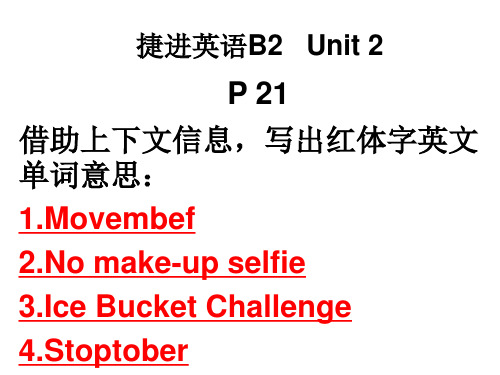
捷进英语2 P22 课文讲解Unit 2
• (What started始于as a small challenge小 型挑战between friends )grew very quickly 迅速壮大when some famous baseball players棒球运动员joined in. Since then,
Unit 2 捷进英语2 Reading for Learning课文讲解
• So did all the publicity如此高的曝光率 make much money for the charity为ASL 基金会募集到了善款? From 29 July to 28 August in 2014, ALS Association received $94.3 million 9,430 万美元, compared with 对比$2.7 million 270 万美元donated during the same period in 2013.
want to give myself a chance but also
give a lot of other people opportunity as well也.”
Unit 2 捷进英语2 Reading for Learning课文讲解
• In July 2014, Pete and his friend Pat Quinn started the Ice Bucket Challenge发起了“冰桶挑 战”. People have a bucket of iced water poured over their head从头上浇下and then nominate someone else点名其他人to do the same. Videos of it视频are then shared on social media社交网 站上分享. The nominee被点名的人can either accept and donate money to the ALS Association ALS 基金会or refuse拒绝挑战and donate more money. The more people take the challenge接受挑战的人the more money is raised 筹集.
新人教版高中英语选择性必修四Unit2Iconic Attractions单元分析

单元分析单元主题:人与社会——标志性风物单元内容分析本单元的主题语境是人与社会,涉及的主题语境内容-标志性风物:包括澳大利亚的标志性景点(the Sydney Opera House等);法国的埃菲尔铁塔;新西兰的标志性景点。
旨在让学生能熟悉本单元中的标志性风物;能够从不同的角度探究标志性风物的文化内涵。
本单元的另一个主题语境人与自然,旨在让学生在国际视野下,对比了解自己的家乡、城市和祖国有代表性的风物,如音乐、景观、民俗、建筑、风味等。
听说读写等活动主要是描述标志性动物,了解自然环境、自然遗产的保护。
第二篇阅读是通过作者描述的4种动物-kangaroo,koala,Tasmanian devil 和duck-billed platypus,让学生从文章中了解描述动物是从动物的居住环境、食物、长相、与其他动物的区别等方面来描述的,从而掌握如何写“描述中国的标志性动物”的文章,启发学生对家乡风物的观察,增强对祖国、对自己故乡风物的认同感,增强文化自信,增强对事物的认知、鉴赏能力。
以下为教材各部分教学内容简要分析及教学活动实施建议:1.Opening Page本单元围绕“标志性风物”的主题展开,以澳大利亚、新西兰两个国家中的风景名胜、特有的动物、特色食品、风俗人情为主要例子,穿插介绍了世界各地有历史积淀、特殊意义或现代特征的标志性风物。
从时间和空间两个维度培养学生的审美情趣和人文情怀。
单元主题图展示了澳大利亚著名的标志性建筑-悉尼歌剧院。
它坐落在悉尼港,其独特的风帆和贝壳造型出自丹麦建筑设计师约恩·乌松。
建成于1973年的悉尼歌剧院虽然历史并不悠久,但却成为少数被列入世界文化遗产的现当代建筑物。
这座极具代表性的建筑能让读者立刻想到澳大利亚。
主题图的设计能有效地帮助学生理解单元主题词iconic的含义。
当谈及一个国家或一座城市时,每个人心中对同一地方的具有代表性的事物可能会有不同的看法,但是这些事物一定是给人们留下深刻印象的东西,也通常是在大家眼里美好的东西。
剑桥少儿英语KB4下学期知识梳理
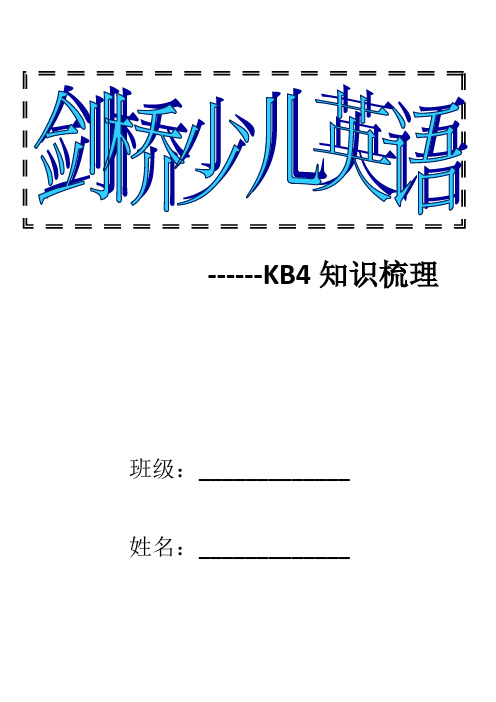
------KB4知识梳理班级:_____________姓名:_____________KB4-Unit5 Exploring our world一.单词:1.动词及过去式(四会):find—found (发现,找到) catch—caught(抓) take—took(乘坐) go—went (去) make—made(制作) get—got(获得) have —had(有) can’t—couldn’t (不能) lose—lost(失去) come—came(来)2.形容词比较级:(四会)difficult—more difficult famous—more famous easy—easier(三会)boring—more boringexciting—more exciting beautiful—more beautiful二.短语:started the expedition:开启行程closed round:包围took smaller boat:乘坐小船made a camp:扎营went down: 下降lost their ship:失去他们的船caught fish:抓鱼drank water:喝水had to:不得不came home:回家went to a museum:去博物馆read explorer’s diaries:读探险家的日记made a poster:做海报sea animal:海洋动物took a photograph of:为------照相caught the bus home:乘坐公交回家ate sandwiches:吃三明治wait for the bus:等公交lost their map: 丢失地图had a great time: 开心三.句子:1. Cousteau is more famous for his work.2. Our homework was easier than theirs.3. Shackleton’s adventures were more difficult than Cousteau’s.4. My book on sharks is exciting.5. My book on explorers is more interesting than yours.6. Crossing Antarctica is more difficult than climbing trees.7. Columbus is more famous than Cousteau.8.Helen’s photos of Africa are more beautiful than ours.9.Sailing is more exciting than walking.10.Our homework was more boring than theirs.11.Ours was easier than theirs.12. I had time to watch TV after I finished mine.附:语法知识(一)形容词的比较级:1)直接在词尾加er,如:tall—taller small—smaller long —longer2)双写末尾辅音字母,如:big—bigger thin—thinner3)辅音字母+y结尾,把y变i, 加er,如:heavy—heavier easy—easier4)多音节形容词,在原级前加more,构成比较级,如:famous—more famous difficult—more difficult boring—more boring exciting—more exciting beautiful—more beautifulcareful—more carefulgood -better -best bad-worse-worstKB4-Unit6 Modern life一.四会词:名词:email(邮件) screen(屏幕) the Internet(因特网) DVD(视频光盘) video(录像带) button(按钮) computer(电脑) mouse(鼠标) MP3 player(MP3播放器)过去式:say—said(说话) know—knew(知道) put—put(放)buy—bought(买) think—thought(想) read—read(读)bring—brought(带来) choose—chose(选择)三会词:camera mobile phone photo二.短语(过去式):got up(起床) got dressed(穿衣服) went to school(去学校) gave one’s a present(送给礼物) had a cup of tea(喝茶) bought a ball(买球) had lunch(吃午饭) caught a ball(接球) read a book(读书) took off one’s sweater(脱衣服) put on one’s shoes(穿鞋) went to the cinema(去电影院) 三.句子:1.Has2.Can you use a computer?3.What time did Marry get dressed?di d ,didn’t does, doesn’t 后面加动词原形She got dressed at 8 o’clock.4.What did you do yesterday morning?I got up at seven o’clock.5.Grandma and Grandpa went shopping yesterday. They bought acomputer. They chose a KBX4 because Grandma read about it and the man in the shop thought it was better than the others. The man brought it home later. He took it out of the box, put it on the table and said goodbye. He thought they chose the KBX4 because they knew about computers! 6.Why does Grandma want a computer?Grandma wants a computer so she can email her old friend in Australia.7.Who knows about computer? Stella knows about computers.8.What do you have to hold? You have to hold the mouse.9.Who wants a DVD? Grandpa wants a DVD.10.What did Grandma and Grandpa do yesterday? They went shopping.11.What did they get? They got a computer.12.What's their computer called? It’s called a KBX4.13.What problem have they got? They don’t know how to turn it on.KB4-U7 At the zoo一.四会单词:1、形容词最高级:(1)直接加est:the quickest,the quietest,the loudest,the longest,the tallest(2)双写加est:the biggest(3)变y为i,加est: the heaviest(4)特殊:the worst, (bad/ badly) the best (good/well)(5)加most:the most exciting, the most beautiful, the most boring, the most clever2、动词过去式:画画draw---drew, come---came,开车drive---drove, 看见see---saw,游泳swim---swam, 睡觉sleep---slept, 去go---went, 飞fly---flew, 买buy---bought, 坐sit---sat, 抓住/赶上catch---caught, 吃eat---ate3、介词:out of出来, into进入, round环绕三会单词:quiz知识竞赛, point点/分数, fact事实, weigh重, kilogram公斤, press按, correctly正确地,ran跑(过去式)二.重点句子:1.Lenny thinks the most exciting animal is the giraffe.2.The whale’s the loudest.3.The painting of the elephant is the worst.4.Mr Star drove the children to the zoo.5.Which animal is the ugliest? ---The ... is the ugliest.6.Which animal is the most dangerous?---The ... is the most dangerous.7.Which animal do you think is the quickest?---I think the ... is the ...三.问答句子:Where are Lenny and Stella?---They are at school.Who’s asking the questions?---Mr Burke is asking the question. What’s the quiz about?---It’s about animals.Who do you think is winning?---I think Stella is winning.Where did the children go?---They went to the city zoo.Who did Suzy give her picture to?---She gave her picture to her mum. What animals did they see?--They saw lions,dolphins,parrots and a lizard.Which animal did Simon like the best?---He liked the lizard the best.KB4-Unit8 Let’s party!一.单词四会词:salad(沙拉)pasta(意大利面)sandwich(三明治)soup(汤)cheese(芝士,奶酪)cup(茶杯)bowl(碗)box(箱、盒)bottle(瓶)三会词:coffee(咖啡)egg(鸡蛋)lemonade(柠檬水)tomato (tomatoes)(西红柿)water(水)副词的最高级:quickly—the most quickly carefully—the most carefully slowly— the most slowly well—best badly-worst 动词的过去式:make—made (制作)eat—ate(吃)wear—wore(穿戴)drink— drank(喝)dance—danced(跳舞)give—gave(给)is—was(是)am – was(是)are—were(是)二.短语(三会):a bowl of (一碗------) a bottle of(一瓶------)a cup of(一杯------) a glass of(一玻璃杯------)a box of(一盒------)make a sandwich(做三明治) open the window(打开窗户)open the door(开门)close the window (关窗)close the door (关门)text your friend(短信你的朋友)turn on the computer(打开电脑)turn on the light(开灯)turn off the computer(关电脑)turn off the light (关灯)三.句子:1. Can you pass me a bowl of salad, please?2. Can you take a bowl of pasta to the table, please?3. Could you put these sandwiches on the table please?4. Do you want a cheese sandwich?5. I need a glass of lemonade.6. The clown is jumping the most quickly, but not the most carefully.7. The doctor is jumping the worst.8. The artist is jumping the most slowly.9. She is doing very well.四.句型转换:Want sb.(某人) to do sth.(某事)1. --- Can you close the window, please?--- She wants him to close the window.2. --- Can you take these dirty cups to the kitchen please, children? --- She wants them to take the cups to the kitchen.3. --- Can you make some coffee, please?--- He wants her to make some coffee.。
剑桥少儿英语KB2unit4课文

STELLA:Can I play,Suzy?SUZY:OK.STELLA:where's my bedroom?SUZY:It's there,next to the bathroom.STELLA:OK.SUZY;Put this blue mat on the floor next to your bed.STELLA:Can I have a phone in my bedroom?SUZY:No,you can't.The phone's in the living room next to the sofa.STELLA:Can I have a lamp,please?SUZY:OK.You can put the lamp on the table next to your bed.STELLA:Thanks,suzy.Where can I put the armchair?SUZY:Put it in the living room under the clock.STELLA:Is there a mirror in my bedroom?SUZY:A mirror in your bedroom?No,there isn't.There are three mirror in your bedroom?No,there isn't.There are three mirrors.One in the Bathroom,one in my bedroom and one in Simon's bedroom. Stella:Oh.STELLA:Can I play,Suzy?SUZY:OK.STELLA:where's my bedroom?SUZY:It's there,next to the bathroom.STELLA:OK.SUZY;Put this blue mat on the floor next to your bed.STELLA:Can I have a phone in my bedroom?SUZY:No,you can't.The phone's in the living room next to the sofa.STELLA:Can I have a lamp,please?SUZY:OK.You can put the lamp on the table next to your bed.STELLA:Thanks,suzy.Where can I put the armchair?SUZY:Put it in the living room under the clock.STELLA:Is there a mirror in my bedroom?SUZY:A mirror in your bedroom?No,there isn't.There are three mirror in your bedroom?No,there isn't.There are three mirrors.One in the Bathroom,one in my bedroom and one in Simon's bedroom. Stella:Oh.STELLA:Can I play,Suzy?SUZY:OK.STELLA:where's my bedroom?SUZY:It's there,next to the bathroom.STELLA:OK.SUZY;Put this blue mat on the floor next to your bed.STELLA:Can I have a phone in my bedroom?SUZY:No,you can't.The phone's in the living room next to the sofa.STELLA:Can I have a lamp,please?SUZY:OK.You can put the lamp on the table next to your bed.STELLA:Thanks,suzy.Where can I put the armchair?SUZY:Put it in the living room under the clock.STELLA:Is there a mirror in my bedroom?SUZY:A mirror in your bedroom?No,there isn't.There are three mirror in your bedroom?No,there isn't.There are three mirrors.One in the Bathroom,one in my bedroom and one in Simon's bedroom. Stella:Oh.STELLA:Can I play,Suzy?SUZY:OK.STELLA:where's my bedroom?SUZY:It's there,next to the bathroom.STELLA:OK.SUZY;Put this blue mat on the floor next to your bed.STELLA:Can I have a phone in my bedroom?SUZY:No,you can't.The phone's in the living room next to the sofa.STELLA:Can I have a lamp,please?SUZY:OK.You can put the lamp on the table next to your bed.STELLA:Thanks,suzy.Where can I put the armchair?SUZY:Put it in the living room under the clock.STELLA:Is there a mirror in my bedroom?SUZY:A mirror in your bedroom?No,there isn't.There are three mirror in your bedroom?No,there isn't.There are three mirrors.One in the Bathroom,one in my bedroom and one in Simon's bedroom. Stella:Oh.STELLA:Can I play,Suzy?SUZY:OK.STELLA:where's my bedroom?SUZY:It's there,next to the bathroom.STELLA:OK.SUZY;Put this blue mat on the floor next to your bed.STELLA:Can I have a phone in my bedroom?SUZY:No,you can't.The phone's in the living room next to the sofa.STELLA:Can I have a lamp,please?SUZY:OK.You can put the lamp on the table next to your bed.STELLA:Thanks,suzy.Where can I put the armchair?SUZY:Put it in the living room under the clock.STELLA:Is there a mirror in my bedroom?SUZY:A mirror in your bedroom?No,there isn't.There are three mirror in your bedroom?No,there isn't.There are three mirrors.One in the Bathroom,one in my bedroom and one in Simon's bedroom. Stella:Oh.。
剑桥少儿英语KB4-UNIT 2 Test A
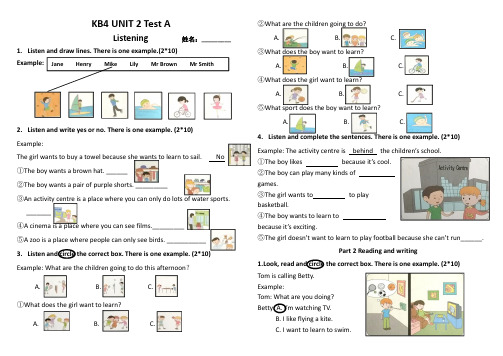
⑤
. The team that gets more scores will win.
5.Look, read and answer the questions. There is one example. (3*15)
Jim likes sports very much. His favourite
Mary is in the park with her family.
①There are many people there.
_____________________________________
②Mary is learning to skate with her sister._____________________________
in the school sports centre every Friday afternoon
with his friends. Jim’s best friend Mike isn’t good at basketball. He’s shorter
than Jim. But he runs faster. Mike is a good football player. He plays football in
he plays very well. He often plays basketball with his friends in the sports
centre on weekends. There are two ②
of five ③
.
Both teams try to get ④
by throwing the ball into the
C. Yes, I can.
四上牛津英语M4U2知识点归纳
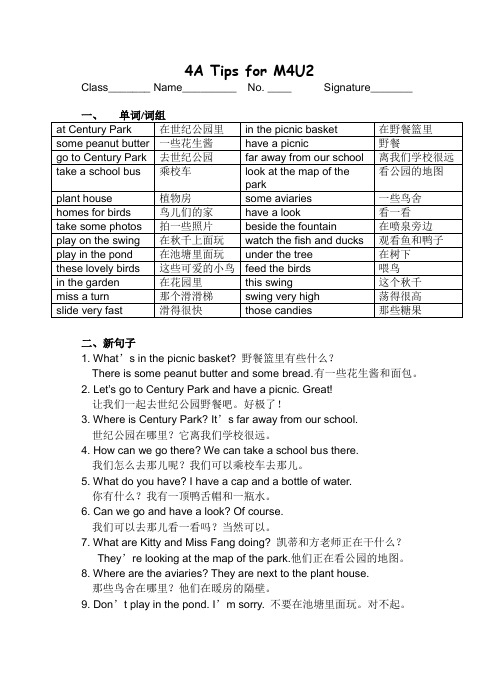
4A Tips for M4U2Class_______ Name_________ No. ____ Signature_______二、新句子1. What’s in the picnic basket? 野餐篮里有些什么?There is some peanut butter and some bread.有一些花生酱和面包。
2. Let’s go to Century Park and have a picnic. Great!让我们一起去世纪公园野餐吧。
好极了!3. Where is Century Park? It’s far away from our school.世纪公园在哪里?它离我们学校很远。
4. How can we go there? We can take a school bus there.我们怎么去那儿呢?我们可以乘校车去那儿。
5. What do you have? I have a cap and a bottle of water.你有什么?我有一顶鸭舌帽和一瓶水。
6. Can we go and have a look? Of course.我们可以去那儿看一看吗?当然可以。
7. What are Kitty and Miss Fang doing? 凯蒂和方老师正在干什么?They’re looking at the map of the park.他们正在看公园的地图。
8. Where are the aviaries? They are next to the plant house.那些鸟舍在哪里?他们在暖房的隔壁。
9. Don’t play in the pond. I’m sorry. 不要在池塘里面玩。
对不起。
10. What do they like? They like this swing.他们喜欢什么?他们喜欢这个秋千。
三. 语法知识:本周复习了表示方位的介词:1.at表示"在.处",一般指较小的比较具体的地点.如:He isn't at school. He is at home.他不在学校,他在家.2.in表示"在...内部;在...里面"的意思.如:What is in the box?盒子里有什么?3.on表示"在某物的上面",但两者互相接触.如:My books are on that table.我的书在那张桌子上.4.under表示"在某物垂直的正下方",两者之间不接触.如:My cat is under my chair.我的猫在我的椅子下.5.behind表示"在某物体的后面","在...之后".如:The broom is behind the door.笤帚在门后.There is another fruit tree behind the house.房后还有一棵果树. 6.in front of表示"在...的前面",正好与behind相反.如:There are some big trees in front of our classroom.我们教室前面有几棵大树.There is a fruit tree in front of the house.房子前面有一棵果树.7.near/beside表示"在某物体的附近",意为\"接近、靠近\".如:The ball is near the door.球在门旁边.8. next to表示“紧挨着,紧邻着”The book shop is next to the toy shop. 这家书店在玩具店的旁边。
北师大版英语U2 Lesson 4 Class Projects 2
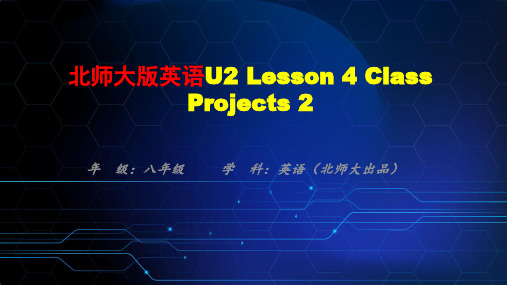
Modal Verbs 情态动词 2. must, must not (mustn’t)
mustn’t 表示“一定不要”,语气强硬。例如: It’s a secret. You mustn’t tell anyone. We mustn’t waste our time.
Modal Verbs 情态动词 3. have to, do not (don’t) have to
北师大版英语U2 Lesson 4 Class Projects 2
Review the words.
teamwork 协同合作,配合
musical 音乐的
instrument 乐器
wood
木头
bottle
瓶子
camera 照相机
chopsticks 筷子
glue metal paper plastic material object
Modal Verbs 情态动词
3. have to, do not (don’t) have to
don’t have to 表示“没有必要”。例如: You can tell me if you want but you don’t have to. I’m not working tomorrow, so I don’t have to get up early.
3. You can use dictionaries in English class, but you can’t use them for tests.
can’t 表示“不能够”“不会”“不可以”。例如: You can’t stay out late. You can’t smoke here.
Modal Verbs 情态动词 2. must, must not (mustn’t)
- 1、下载文档前请自行甄别文档内容的完整性,平台不提供额外的编辑、内容补充、找答案等附加服务。
- 2、"仅部分预览"的文档,不可在线预览部分如存在完整性等问题,可反馈申请退款(可完整预览的文档不适用该条件!)。
- 3、如文档侵犯您的权益,请联系客服反馈,我们会尽快为您处理(人工客服工作时间:9:00-18:30)。
Active reading 2: Nauestions answered in the text.
Personal thinking about reading
Introduction
Q1
Q2
Text organisation
Q3
1. How did I struggle to obtain books? (para2)
Active reading 2: Navigation
Read para1 and then discuss about your response toward the last sentence.
The fact, however, that in the past I did most of my work without the aid of a library I look upon as an advantage rather than a disadvantage.
Active reading 2: Embarkation
Eliciting opinions
Prediction
Active reading 2: Embarkation
Topic preview: Watch a video clip about the greatest stories students have ever read and discuss the HOME-RUN books students need to read.
2. What makes a book live? (para3-4)
3. What is my suggestion of reading? (para5-7)
Active reading 2: Navigation
Text organisation
Para7: the reason Para 6: a way to testify Leave a book alone for a few days and think intensely as you can
1. Books always out at the public library 2. No money to buy books 3. Impossible to get demoralizing works
Do you have similar experience? How do you get books?
Mapping
Embarkation
Navigation Destination Resources
Active reading 2: Mapping
Learning outcomes
Reading to find out different ways to present arguments Reading to follow style shift Reasoning with different views
Classroom report:
50 books recommended to every girl and boy
See the differences between the boys‟ and girls‟ choice.
Active reading 2: Embarkation
Eliciting opinions 2
See Miller‟s list next page
Active reading 2: Embarkation
Eliciting opinions
The list of 100 books (Henry Miller)
Strindberg, August, The Inferno Arabian Nights (for children) Scott, Sir Walter, Ivanhoe Elizabethan Playwrights Emerson, Ralph Waldo, (excepting Shakespeare) Representative Men Ancient Greek Dramatists European Playwrights of 19th Century Greek Myths and Legends Joyce, James, Ulysses
Contradictory? Unreasonable? Inexplicable? Ironic?
Active reading 2: Navigation
Jigsaw reading: Prediction
Read the last sentence again and predict which statement the writer may support.
Active reading 2: Navigation
Jigsaw reading: task-oriented reading 2
Read paras 3-4 and figure out the reason(s) that make(s) a book live. Reason
A book lives through the passionate recommendation of one reader to another.
The Greatest Story Ever Read For Chinese children, what story or stories are the most popular?
Bridging information gap
Active reading 2: Embarkation
Eliciting opinions 1
Group discussion and class report: Compare your choice with Henry Miller„s list Girls: Do you share any principle with Henry Miller? Boys: Are there any different principles between you and Henry Miller?
Statement 1
Statement 2
The more you read, the better it would be!
Read as little as possible, not as much as possible!
Would You agree?
Were you the writer, how would you support it?
Active reading 2: Embarkation
Eliciting opinions
Same principles
Reading classical works
Choosing books which have huge influence at that time Selecting serious books Reading books which reflect current issues Reading books written by well-known books …
Maeterlinck, Maurice, His works in general
Knights of King Arthur's Court Mann, Thomas, The Magic Mountain Swift, Jonathan, Guilliver's Whitman, Walt, Leaves Travels of Grass…
5. Read as little as possible
Did you ever think the last is what the author offers?
Active reading 2: Navigation
Text organization Text exploration Jigsaw reading Understanding the writer‟s style Text evaluation
Discuss your response toward this reason.
Agree Disagree
Common: Readers cannot wait to share their experience of reading with others. Too simple: The most important reason which makes a book live is the book itself.
Active reading 2: Embarkation
Prediction
What suggestion would you like to offer for the readers if you were Henry Miller.
1. Never lend a book to anyone 2. Spend all your money on books 3. Think about a book before you start reading it 4. Don’t read any books which are considered to be immoral
A vast majority of books overlap one another
Para7: an exception al reader
Read as little as possible
Para5: Suggestion
Blaise Cendrars: Julius Caesar of literature
